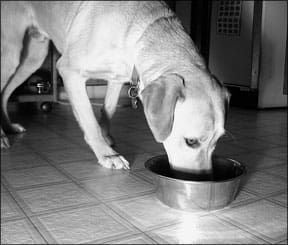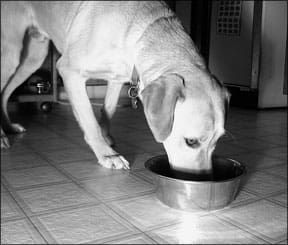There have been pet food recalls before, and there will be recalls in the future, but the event of early 2007 will probably be recorded as the costliest pet food recall in history. However, it’s my hope, and the opinion of many, that the lessons learned from this infamous event should prevent any similar large-scale pet food disaster from happening ever again.
Note that none of the companies whose executives are quoted below had products involved in the recalls. But every pet food company in the country was affected by the firestorm of inquiries from terrified pet owners who sought information about their pet foods.
I appreciate the seriousness, honesty, and commitment to providing quality foods that these executives exhibit here.
Phil Abreo, Breeder’s Choice
The recalls put the pet food industry on alert; we must be more diligent in assuring that all companies involved in the ingredient-sourcing chain are the most reliable and follow the highest food safety procedures.
Peter Atkins, Natura
Consumers are interested in more than just a pretty bag and are now reading – more accurately, scrutinizing – labels like never before. There is obviously a heightened state of consumer awareness about pet foods, pet food companies, and the ingredients that go into pet foods. Customers have a new expectation for transparency – where their food is manufactured, where ingredients come from, and the types of testing employed by the manufacturer to assure safety. Based on the dramatic spike in our sales, customers are obviously seeking products from smaller suppliers of holistic, organic, and natural products.

288
Brian Connolly, Castor & Pollux
There have been several outcomes. One is the need for pet food companies to be more forthcoming with information as to where their products are made and where ingredients are sourced. From the first day of the first recall, we provided pet parents with information on who made our custom formulation canned products for us. This was done via our website, in the thousands of e-mails that Shelley (my wife and co-founder) personally answered and on the phone with our customer service team. Even though we are a small company (just 17 people), we are committed to being as transparent as possible – unlike some other companies that chose to hide behind automated answering services and answers like “I’m sorry, but I’m not allowed to release that information.”
The other outcome has to do with overall pet food safety. All manufacturers are paying much more attention to where ingredients come from and the quality/safety associated with those ingredients.
You can’t test your way to safety; you need to know that the ingredients are safe from the time the seeds are planted in the field, through the growing, handling, processing, storage, transportation, and manufacturing process.
With our Organix food, pet owners have the benefit of knowing that an independent third-party organic certifying agency under the mandate of the USDA’s National Organic Program has the responsibility of doing this. Each and every ingredient in Organix must be reviewed and approved for inclusion in our formula by the organic certifying agency. This third-party review and approval process does not apply to “natural,” “holistic,” or “human grade” pet foods. Certified organic pet foods and treats take safety to another level.
Deborah Ellinger, Wellness
The recall taught consumers how important it is to focus on the ingredient choices and quality standards of the brands behind the products. A positive outcome of the recall is that consumers are more aware of what is in their pet’s food, and are reading labels and asking more questions. The industry as a whole is responding, and this will ultimately improve all products.
John Marsman, Eagle Pack
The events made both pet food and human food companies more aware of food safety vulnerability. Companies have become more aware that the recalls have heightened pet owner awareness about ingredient quality, ingredient country of origin, where the brand is made, whether they make their own food in their own plant, best manufacturing practices, quality control, and company integrity.
It is no longer good enough (and it was never right), for a company to say ingredients are purchased from US companies when that company is a broker that may be importing, or is an importer. The brand should know the origin of ingredients. (Eagle Pack is EU certified, which requires disclosure of the country of origin of the ingredients.)
Lucy Postins, The Honest Kitchen
The industry has been forced to take a very close look at its ingredient-sourcing and manufacturing practices. Above all, pet food manufacturers (as well as the companies who are actually named on the labels) have been forced to become more accountable for their products and the ingredients that go into them. Ignorance and naiveté will no longer be tolerated.
Ultimately, the company whose name is on the bag is responsible to the customer. Contract manufacturers are accountable to their clients but it should be the responsibility of the company that takes the public’s money, to ensure their products are safe and that their labels are truthful.
Ron Rompala, Blue Seal
Pet owners [now] have a lower degree of confidence in commercial pet food. Owners are more likely to blame the food for problems that their pets may encounter and are less likely to hesitate to find alternative foods.
Have you changed anything about the way you operate your business since the recall?
-For example, have you changed the way you source or test ingredients?
-Made changes to the manner in which you utilize or oversee contract manufacturers?
-Developed a consumer-response plan in case of any future problems?
Phil Abreo, Breeder’s Choice
We continue to test all ingredients and have minimized the few ingredients we source from outside of North America.
We continue to require that every vendor certify all ingredients and provide us with a guaranteed analysis. We also test ingredients in our quality control lab and confirm results prior to being utilized during production. We now require the contract manufacturers that make our wet foods to provide us with manufacturing records for all production runs of our wet products.
Also, we have reviewed and updated our recall procedures and established a crisis management team to ensure 100 percent implementation of the plan.
Peter Atkins, Natura
We’ve always had quality management programs, validated by third-party certifications, that have enabled us to supply our customers with the highest quality and safest products in the industry.
Because of the recall we have made a huge investment in new testing protocols for melamine and cyanuric acid. We have also directed our buyers to source ingredients from domestic sources and, in the few cases where an ingredient is only available offshore, we have instituted an elevated level of control and testing.
We did make changes to the manner in which we utilize or oversee contract manufacturers [currently, Natura’s wet products are made by a contract manufacturer]. We have a heightened presence at their manufacturing facility and have instituted a rigorous quality management program which requires the contractor to prove their quality controls with detailed reports on each production run.
We have always had a consumer-response plan as part of our quality management program.
Brian Connolly, Castor & Pollux
The recalls caused us to really step back and evaluate all aspects of our business from ingredients to providing more information to pet parents.
The battery of tests that we run on all of our Organix and Natural Ultramix production has increased to include tests for melamine and cyanuric acid. We have established even tighter quality control standards and are working to augment our staffing in this area, too. We are posting even more information on our website to allow pet parents to make informed purchasing decisions. And we have changed a number of ingredient suppliers and have more detailed protocols related to our expectations of them.
Even though this was our first experience with a recall, we already had a consumer-response plan in place but were able to improve upon it as a result of this experience. Most important to us was staying accessible to pet parents and retailers that carried our products.
Deborah Ellinger, Wellness
We performed a full review of all of our practices, even though we were not impacted by the recall. We already had human-grade auditing processes and controls in place for our manufacturing, along with a robust ingredient sourcing approach, so we did not need to make significant changes to our processes or our manufacturing relationships.
However, like most others, we added testing for melamine and other contaminants that were identified in the recall, and we continue to look for improvement opportunities. We also expanded our phone center and added more product information on our website to help consumers get answers to their questions.
Since our products were not affected by the recall, we have attracted a lot of new consumers. We have had to step up our production dramatically, and are now spending a lot more time forecasting demand and trying to meet our customers’ increased needs.
John Marsman, Eagle Pack
Naturally we started testing ingredients and both dry and canned food for melamine (everything was negative) and reviewed our “best manufacturing practices” plan. Fortunately, due to our program and our EU certification, all safety procedures were in place. While it reaffirmed the way we do business, we also enhanced testing and reviewed sourcing procedures with quality-certified long-term suppliers.
We looked to eliminate any China-sourced ingredients, but this is not possible for taurine, glucosamine, and at least one vitamin. Virtually all brands must buy these ingredients from China; I strongly question any brand that states otherwise. Vitamin premixes are comprised of at least 13 vitamins. Of the two biggest vitamin makers in the world, neither one makes all of its own ingredients. They, too, outsource. A responsible pet food maker must know this if it is to be in control.
We make all our dry food here in Mishawaka, Indiana. For our contract can manufacturing, we specify high quality ingredients. We did review all procedures and ingredient sourcing with the maker. They will not add or substitute ingredients without asking, and we rejected substitution the times they asked.
Lucy Postins, The Honest Kitchen
Since our products are made in a human food plant – not in a pet food plant – many of the measures that conventional pet food manufacturers are now adopting were already part of our procedures and protocol. Our production is all under human food standards so ingredient substitutions and formula changes are simply not allowed. That is precisely why we chose a human food plant to make our products.
So, we have not really had to change much ourselves in the way of operations. Our company already takes responsibility for directly sourcing, ordering, and paying for 100 percent of its own ingredients; we do not allow the facility that makes our diets to buy ingredients on our behalf. We know our vendors directly and take direct responsibility for what goes into our foods.
Although we don’t buy or use any of the ingredients that were found to be contaminated (we use meats, not plants, as sources of protein), and we had no reason whatsoever to suspect that there was any risk to our products, we did realize that amid the state of panic that ensued, no company’s word alone was good enough. Therefore we decided to implement melamine testing immediately on all finished products.
We paid for overnight testing so that we could offer the peace of mind of melamine-free certificates to customers right away (and found it curious that FDA repeatedly stated they would not have results for two weeks). We also put new measures in place to have each of our raw ingredients screened for melamine prior to production. Going forward, melamine screening has been added to the list of routine screens we run on all finished products.
Ron Rompala, Blue Seal
We have increased our efforts to better know our suppliers. More stringent requirements are in place for new suppliers. We have accelerated establishing HAACP (hazard analysis and critical control points) plans and having plants in condition to be approved by AIB (the American Institute of Baking). We also have performed spot checks for melamine and increased the number of assays for other contaminants such as heavy metals and PCBs. We have increased the size of our customer service department.
We did not have any products affected by the recall but we were inundated by phone calls from current customers with concerns and from pet owners that had used products that were recalled and looking for alternatives.
We increased the number of people attending the phones and e-mail responses. We established an auto-reply to provide information via e-mail or telephone immediately to concerned customers. I met daily with the people in customer service to keep them updated on the situation and provide information to better answer questions. I also spoke directly with several customers to alleviate technical issues. As I mentioned earlier, pet owners were not hesitating to voice concern and wanted reassurances if their animals exhibited any perceived problems.
In your opinion, did consumers overreact? What do you think consumers should do differently in case of future recalls?
Phil Abreo, Breeder’s Choice
The consumer’s first concern or priority has to be the safety of their pet. Consumers diligently sought out information through the media, Internet, and in many cases, contacted the manufacturer for information. Consumers acted in a very responsible manner to seek out as much information as possible in order to protect their pets.
Peter Atkins, Natura
Absolutely not. Perhaps the media can be blamed for creating a panicked frenzy by running constant fear stories without a lot of specific substance in many cases. But one can’t really fault pet loving families for responding aggressively and seeking the truth for the health and safety of their companions. And if the end result is that hundreds of thousands of consumers have abandoned formerly trusted products that were perceived as “premium” for healthier and safer alternatives, can one really say that is an overreaction? In my opinion, it is an appropriate adjustment to the new realities of the market.
God forbid that there is another recall. But should it occur, consumers should gather good, accurate, and truthful information from trusted sources. They should measure very carefully all the information made available and apply this information rationally, without painting every pet food company with the same soiled brush. And consumers should not throw away food packaging until the food has been consumed so that if there is an issue, the proper date code numbers are accessible.
Brian Connolly, Castor & Pollux
I don’t think consumers overreacted at all given what they knew about pet food manufacturing, and given this entire experience was truly terrifying for them. Rolling recalls like these had never occurred before, and there was so much uncertainty as to what the problem was, what brands were affected, and what might be coming next. Certainly some of the misinformation on the Internet blogs didn’t help consumers at all. Most assumed that all pet food manufacturers had their own plants; even though this isn’t even true of human food producers, it was a shock to many to learn this.
I also don’t think that most people understood that you can’t run “one test” to prove something is safe. You need to know what you’re testing for and then run the test that is specific to that. And, I think the extent of our global economy was not fully understood. The fact that some ingredients in pet foods just aren’t available in this country came as a real surprise to many, too.
Our advice to consumers in the case of future recalls: Get to know – now – what the brand stands for that you are feeding your pet. Send the company an e-mail or give them a call to ask questions. Get a sense for how open and honest they are and how quickly they respond to you. See if they have a list that you can be added to for future notification.
Deborah Ellinger, Wellness
No, consumers did not overreact. They did everything they should have done, like watch the news, check the Internet, and call the 800 numbers. Our animal companions are an important part of our lives and they can’t advocate for themselves. Consumers did the right thing by looking out for the pets that depend on them.
John Marsman, Eagle Pack
No way. They had every reason to react quickly and strongly. They were fed misinformation. Correct information was delayed. And the recalls kept snowballing. Pet owners kept wondering if their food was next. This is a “perfect storm” scenario to generate concern and fear among pet owners.
Consumers should not wait for another recall. Just as manufacturers must establish ongoing trust with their suppliers, pet owners must establish trust with a pet food brand. Why ever do pet owners keep coming back to a brand that won’t tell you where it is made, or another that lies about it three consecutive times? If another recall were to occur, pet owners should get a vet report stating that whatever caused the recall issue was directly related to the problem with their pet, and send it to FDA.
Here are questions pet owners should ask in an effort to establish confidence and trust in a brand now, not when the next recall happens:
Who makes your food?
Will you disclose the country of origin of any ingredient or component? And include every vitamin and nutrient, including taurine and glucosamine?
Will you disclose the level of any nutrient in your food if that nutrient is listed in the AAFCO nutrient profiles?
Lucy Postins, The Honest Kitchen
I don’t think it was an overreaction at all. Particularly as things escalated, people just didn’t know where to turn next. I don’t think any industry has ever seen a recall of that magnitude and scope, with brand after brand being added to the list. People were shocked and disillusioned that the products they were buying were made with the same low-grade ingredients as many generic grocery brands – and then shocked all over again when other companies announced they didn’t even know what ingredients were being put in their diets. People found that absolutely absurd, and rightly so. If I didn’t have my own brand of pet food to feed my dogs and complete confidence in my finished products, I think I’d have been in tears, too.
In the face of a future recall, the most important thing is to know your dog. That way, it’s so much easier to spot when something’s up. Tune in to how he behaves at meal times. Does he have a voracious appetite or is it usual to eat more gingerly? What do his eyes look like when he’s healthy and happy? How do his eyes change when he’s under the weather? What are her normal urination and defecation patterns? Pick up poop frequently so you can identify any abnormalities right away; a weekly pickup routine might not reveal blood in the stool quickly enough.
The most important thing where the food itself is concerned, is to hold on to lot codes and manufacture dates. We’ll be launching some exciting packaging options that address this, in the fall.
We have never been proponents of feeding one diet exclusively; feeding a variety of brands and incorporating home-made food into your dog’s daily ration may possibly lessen the effects of consuming a contaminated product in the worst-case scenario.
The sheer volume of recalled products made this disaster almost impossible to keep up with. Make use of the Internet. Sites like Itchmo and Pet Connection may have saved thousands of lives with their up-to-the-minute recall info. Sign up for alerts right away if a recall strikes and please take responsibility for helping elderly relatives or neighbors, or others without Internet access, keep up to date on which brands are affected.
Ron Rompala, Blue Seal
Given the situation, owners did not overreact. The media did overreact and hyped the story. You couldn’t blame the customers for their concerns considering that they heard that pets were dying and a large number of companies recalled their foods for unknown reasons. To make things worse, the number of products and companies involved with the recall grew daily.
I don’t believe owners will act or are expected to act any differently if the situation presents itself again. However, you’ll see a difference in the response of pet food companies; they will be sensitive to complaints and not make any assumptions. Investigations concerning multiple complaints will be taken very seriously and handled more thoroughly and swiftly. I’m sure that pet food companies that did not have a team to handle situations of this nature before, do now.
Phil Abreo, Breeder’s Choice
While no Breeder’s Choice products were involved in any of the recalls, it is troubling that any pet would be exposed to harmful food. Our team of pet nutrition professionals continues to work hard and give maximum effort to provide our customers with the best nutritional and safe products that will provide their pets with a long and healthy lifestyle.
Peter Atkins, Natura
To buy or build a canning plant so that we can have control over all of our manufacturing. And to keep doing what has made us successful and kept us out of the recall mess – maintain the highest standards for ingredients, processing and quality control. Test, test some more, and then test again.
Brian Connolly, Castor & Pollux
Continue the work we started as listed above. We’ve further developed a program related to ensuring our products are safe. Although we’re a small, family-owned company, we’re committed to producing safe, healthy, natural, and organic products for dogs and cats. We’re all pet parents ourselves and take this commitment very, very seriously.
Deborah Ellinger, Wellness
To continue to raise the bar on all aspects of formulation, ingredient choices, ingredient sourcing, quality control, and doing whatever it takes to help pets lead longer, healthier lives. We want to continue to be a company that consumers trust because they know we will always do whatever it takes to provide excellent natural nutrition for their pets.
John Marsman, Eagle Pack
We have made a quality food and have been totally forthright with consumers. We have dedicated ourselves to continue on that path to earn the pet owner’s trust.
Lucy Postins, The Honest Kitchen
We have strengthened our resolve to be 100 percent accountable for everything we produce. We always try to put ourselves in the shoes of the customer, and going forward, every decision we make will be influenced by the question, “How would I feel if I were buying this food, and The Honest Kitchen did this . . . ?” We want to do only things we can be proud of. <
Never take anything for granted. Test, test, test. Partner even more with our vendors to ensure they continue to be committed to our values. Make lots of spot checks and have regular meetings at the manufacturing plant.
Ron Rompala, Blue Seal
Never feel that a company can do too much quality assurance. Although we did not have any products recalled, you can’t feel safe and think that it can never happen to you.






